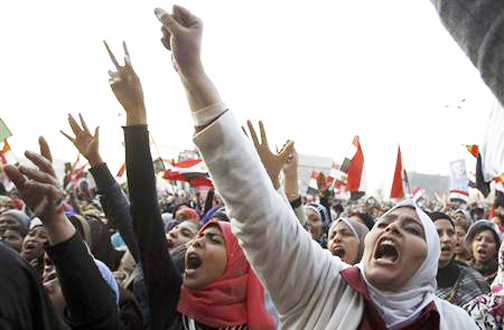CAIRO/ISMAILIA, Egypt, (Reuters) – Seven people were shot dead in the Egyptian city of Suez during nationwide protests against President Mohamed Mursi yesterday, underlining the country’s deep divisions on the second anniversary of the uprising that toppled Hosni Mubarak.
One of the dead was a policeman, medics said. Another 456 people were injured across Egypt, officials said, in unrest fuelled by anger at Mursi and his Islamist allies over what the protesters see as their betrayal of the revolution.
Mursi said the state would not hesitate in “pursuing the criminals and delivering them to justice”. In a statement, he also called on Egyptians to respect the principles of the revolution by expressing their views peacefully.
The Jan. 25 anniversary laid bare the divide between the Islamists and their secular rivals.
The schism is hindering the efforts of Mursi, elected in June, to revive an economy in crisis and reverse a plunge in Egypt’s currency by enticing back investors and tourists.

Inspired by the popular uprising in Tunisia, Egypt’s revolution spurred further revolts across the Arab world. But the sense of common purpose that united Egyptians two years ago has given way to internal strife that already triggered bloody street battles last month.
Thousands of opponents of Mursi massed in Cairo’s Tahrir Square – the cradle of the revolt against Mubarak – to rekindle the demands of a revolution they say has been hijacked by the Muslim Brotherhood, the group from which Mursi emerged.
In Suez, the military deployed armoured vehicles to guard state buildings, witnesses and security sources said, as symbols of government were targeted across the country. Street battles erupted in cities including Cairo, Alexandria, Suez and Port Said. Arsonists attacked at least two state-owned buildings. An office used by the Muslim Brotherhood’s political party was also torched.
“Our revolution is continuing. We reject the domination of any party over this state. We say no to the Brotherhood state,” Hamdeen Sabahy, a popular leftist leader, told Reuters.
The Brotherhood decided against mobilising for the anniversary, wary of the scope for more conflict after December’s violence, stoked by Mursi’s decision to fast-track an Islamist-tinged constitution rejected by his opponents.
The Brotherhood denies accusations that it is seeking to dominate Egypt, labelling them a smear campaign by its rivals.
DEATH IN SUEZ
There were conflicting accounts of the lethal shooting in Suez. Some witnesses said security forces had opened fire in response to gunfire from masked men.
News of the deaths capped a day of violence that started in the early hours. Before dawn in Cairo, police battled protesters who threw petrol bombs and firecrackers as they approached a wall blocking access to government buildings near Tahrir Square.
Clouds of teargas filled the air. At one point, riot police used one of the incendiaries thrown at them to set ablaze at least two tents erected by youths, a Reuters witness said.
Skirmishes between stone-throwing youths and the police continued in streets around the square into the day. Ambulances ferried away a steady stream of casualties.
Protesters echoed the chants of 2011’s historic 18-day uprising. “The people want to bring down the regime,” they chanted. “Leave! Leave! Leave!” chanted others as they marched towards the square.
“We are not here to celebrate but to force those in power to submit to the will of the people. Egypt now must never be like Egypt during Mubarak’s rule,” said Mohamed Fahmy, an activist.
There were similar scenes in Suez and Alexandria, where protesters and riot police clashed near local government offices. Black smoke billowed from tyres set ablaze by youths.
In Cairo, police fired teargas to disperse a few dozen protesters trying to remove barbed-wire barriers protecting the presidential palace, witnesses said. A few masked men got as far as the gates before they were beaten back.
